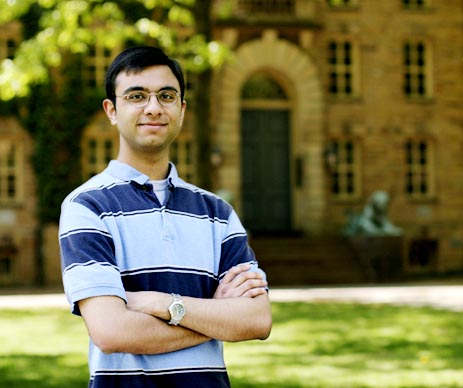

Contents
Valedictorian Phadke embodies Princeton’s spirit of excellence in research and teaching
By Eric Quiñones
Princeton NJ -- When making his college decision, Varun Phadke was swayed by Princeton’s strong undergraduate focus and the opportunity to work closely with faculty members who are considered leaders in their fields.

Valedictorian Varun Phadke, a molecular biology major, has conducted cutting-edge research and served as a mentor to fellow students.
In his four years at the University, Phadke has achieved a reputation as an excellent researcher and teacher in his own right. A molecular biology major, he has conducted cutting-edge research and served as a mentor to fellow students — demonstrating a combination of intellectual curiosity, maturity and persistence that has earned him the distinction of valedictorian of the class of 2005. He will deliver an address at the May 31 Commencement.
“He’s an independent thinker and shows great creativity,” said Sam Wang, an assistant professor of molecular biology and Phadke’s thesis adviser. “At the same time, he is very low-key and does not make a big deal out of his own accomplishments. He is also a great team player.”
Phadke, who is from Syracuse, N.Y., has amassed a stellar academic record, with A+ grades in five departments: molecular biology, chemistry, economics, French and physics. He has been a teaching assistant in Professor Maitland Jones’ peer-led organic chemistry course; a tutor in chemistry and physics; and a participant in the chemistry department’s outreach program, giving presentations to elementary and high school students as well as Princeton alumni.
This November, following his enrollment in Harvard Medical School, Phadke will present findings from his Princeton senior thesis on brain evolution in animals at the Society for Neuroscience meeting, a national conference attended by 25,000 scientists. He will present with Wang and his thesis collaborator, Lily Johnston, a fellow member of the class of 2005.
With interests in biology, chemistry and physics, Phadke always knew he wanted to concentrate in the sciences at Princeton. His focus on research grew stronger after spending the first semester of his junior year in the study abroad program at Oxford, working in the lab of biochemist Ronald Chalmers.
“I was more like a graduate student than an undergraduate student while I was there. It was a lot of fun,” Phadke said. “That was the first time I had done full-time research for such a long period of time, so I got to work really independently.”
Chalmers described Phadke as being “light years ahead of any undergraduates I have come across in Oxford and equal to the very best I supervised during my six years at Harvard.”
Phadke chose to concentrate in molecular biology to pursue research in Wang’s lab on how the brains of different animals are built and how they evolve. For his junior paper, he studied exotic Latin American birds known as oilbirds to determine whether their ability to travel by echolocation, a form of sonar, requires a particularly large cerebellum to perform complex neural calculations.
“Varun showed tremendous initiative and resourcefulness. He found out that preserved oilbirds can be checked out from the Smithsonian, like books from a library,” Wang said. “The result was a bit disappointing, since the brain architecture of oilbirds was very similar to other non-echolocating birds. As sad as I was to see the idea disproved, the work was beautifully done.”
In his senior thesis, Phadke explored brain evolution across a range of animals, including goldfish, barn owls, zebra finches, rats and cats. He teamed with Johnston, a psychology major and a certificate candidate in neuroscience, to label and examine single cells of the animals’ cerebella.
“Again Varun was resourceful — he got hold of an owl from a researcher from Stanford, a finch from MIT and the other brains here at Princeton,” Wang noted. “They found that within a single neuron, some parts of neurons change over evolution, while other parts stay the same. It’s a lesson in how neurons can evolve in a complex way.”
Johnston said working with Phadke was a “wonderful collaboration.”
“Varun’s dedication, curiosity and thoroughness were apparent from the very beginning, and undoubtedly these qualities contributed as much to his success in other areas as they did in our thesis work,” she said. “While Varun unquestionably brought a great deal of knowledge and skill to our project, what I enjoyed and admired most was his unfailing sense of humor, his even keel during times of crisis (or at least times that felt like crisis), and his passion for knowledge and learning.”
“Varun set an example and a standard for excellence that motivated not only him, but me as well,” Johnston added. “Working long hours and for days on end, trying to get each detail just right, was so much easier knowing Varun was doing the same thing, side by side.”
Looking ahead to medical school, Phadke may further engage his interest in neuroscience, though he has not decided on any particular specialty. Ultimately, he would like to pursue academic medicine, continuing to build on the passion for teaching he has developed through his experiences at Princeton.
“One aspect of my Princeton education that I really appreciate is that I have gotten to know a lot of faculty members really well, a lot better than even my teachers in high school,” he said. “That’s because they make themselves accessible and they’re willing to meet with undergraduates — that’s their primary focus.”
top

